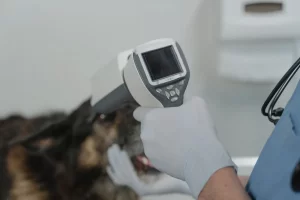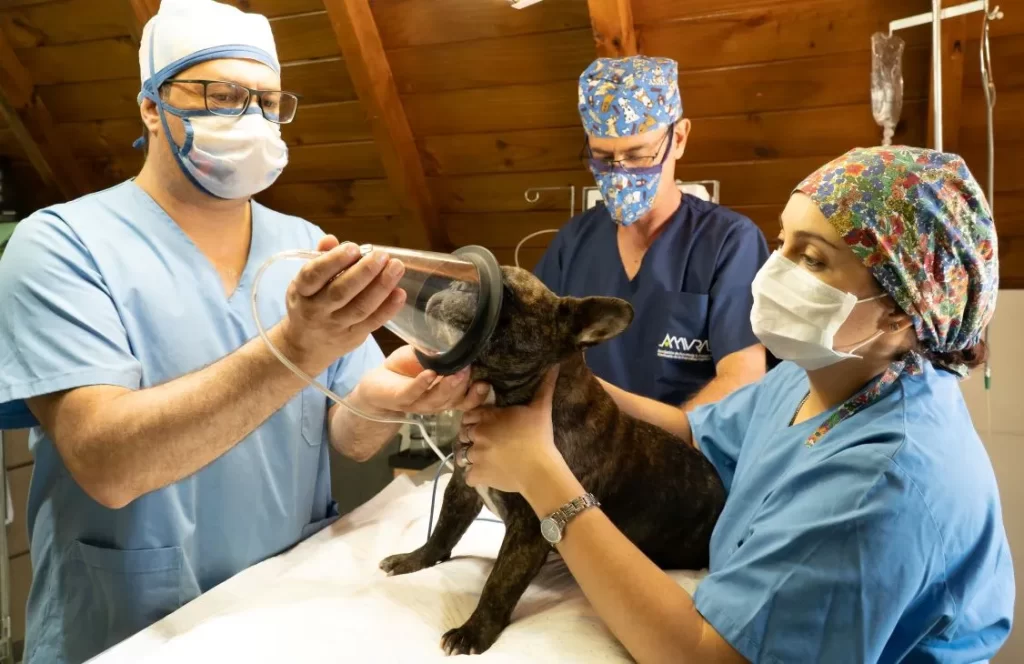Taking your dog to the vet is an important part of maintaining its health and well-being. Regular check-ups, vaccinations, and preventive care can help detect and prevent potential health issues before they become a problem. However, determining how often to take your dog to the vet can be a bit of a challenge. Factors such as age, breed, and overall health can all play a role in determining the ideal frequency of vet visits. In this article, we will cover the most important topics you should be aware of when it comes to taking your dog to the vet, including the recommended frequency of routine check-ups, the importance of preventive care, the signs and symptoms that may indicate a need for a visit, and much more.
Related articles:
Table of Contents
ToggleRoutine Vet check-ups for dogs: A guide by age and breed
- Puppies: Puppies should have regular check-ups every 3-4 weeks until they are 14-16 weeks old. These visits will allow your vet to monitor their growth and development, as well as to complete their vaccinations. It’s important to establish a relationship with your vet early on and to address any concerns or questions you may have about your puppy’s health.
- Adult dogs: Adult dogs should have an annual check-up, where they get a physical examination, blood work and vaccinations if necessary. This is a good time to discuss any changes you’ve noticed in your dog’s behavior or health, and to address any concerns you may have. It’s also a good time to discuss any preventative measures that can be taken to maintain your dog’s overall health and well-being.
- Senior dogs: Senior dogs (7 years and older) should have twice a year check-ups, or more frequently if they have any chronic conditions. As dogs age, they are at a higher risk of certain health issues, such as arthritis, diabetes, and cancer. Regular check-ups will allow your vet to monitor your dog’s health and address any issues that may arise.
- Large breed dogs: Large breed dogs may require more frequent visits due to their higher risk of certain health issues such as hip dysplasia and bloat. These breeds may also have a shorter life expectancy than small breeds so regular check-ups are important to detect and manage any health issues as early as possible.
It’s always best to consult with your veterinarian to determine the best schedule for your dog’s specific needs. Factors such as overall health, lifestyle, and any existing conditions should be considered when determining the ideal frequency of vet visits for your dog.
Preventive care and early detection of potential health issues
Preventive care is essential for maintaining a dog’s health and well-being. Regular check-ups and screenings allow veterinarians to detect potential health issues early on, when they are more likely to be treatable or manageable. By identifying health problems early, it’s possible to take steps to prevent them from becoming more serious, costly, and even life-threatening.
Preventive care can include a variety of different services, such as vaccinations, parasite control, and regular screenings for common health issues, like heartworm, tick-borne diseases, and dental problems. By providing these services on a regular basis, veterinarians can help protect dogs from serious diseases and keep them healthy for longer.
Preventive care also includes monitoring your dog’s overall health and well-being, such as regular weigh-ins and physical exams, which allow veterinarians to detect any changes in your dog’s behavior or health, such as changes in appetite, activity level, or mobility. This is also an opportunity to address any training or behavioral issues that may be affecting your dog’s health.
In summary, preventive care and early detection of potential health issues are key to maintaining your dog’s health and well-being. Regular check-ups and screenings allow veterinarians to identify potential problems early and take steps to prevent them from becoming more serious. By providing these services on a regular basis, veterinarians can help protect dogs from serious diseases and keep them healthy for longer.
Red flags: Signs your dog needs a Vet visit
There are many signs and symptoms that may indicate a need for a visit to the vet. These can include changes in appetite, behavior, or activity level, as well as other physical or behavioral changes.
- Changes in appetite: A sudden decrease or increase in appetite can be a sign of a health problem. If your dog is not eating or is eating less than normal, it may indicate an underlying issue, such as an infection, dental problems, or an underlying medical condition.
- Changes in behavior: Any sudden changes in behavior, such as aggression, anxiety, or confusion, may indicate a health problem. Behavioral changes can also be caused by pain or discomfort, so it’s important to have your dog checked out by a vet if you notice any changes.
- Changes in activity level: A sudden decrease or increase in activity level can be a sign of a health problem. For example, if your dog is lethargic or not as playful as usual, it may indicate an underlying issue, such as an infection, joint pain, or an underlying medical condition.
- Vomiting, Diarrhea, and Constipation: These are common signs that may indicate a gastrointestinal issue or an infection.
- Lameness, Limping: These signs may indicate a musculoskeletal issue or an injury.
- Coughing, Sneezing, or nasal discharge: These signs may indicate an upper respiratory infection or other respiratory issues.
- Lumps, bumps, or skin irritations: These signs may indicate a skin condition or a tumor.
It’s important to note that these are not the only signs and symptoms that may indicate a need for a visit to the vet. If you notice any changes in your dog’s health or behavior, it’s always best to consult with your veterinarian. They can help determine the cause of the problem and provide appropriate treatment.
Vaccinations and Parasite Control for Dogs: A Complete Guide
Regular vaccinations and parasite control are essential for protecting dogs from serious diseases and maintaining their overall health and well-being. Vaccinations help protect dogs from serious and life-threatening illnesses, such as parvovirus, distemper, and rabies, while parasite control helps protect them from fleas, ticks, and other parasites that can cause itching, irritation, and serious health problems.
Here is a list of the most common vaccinations that dogs typically receive and their recommended schedules:
- Distemper: Distemper is a serious and sometimes fatal disease that affects dogs of all ages. The distemper vaccine is typically given as a combination vaccine that also includes protection against parvovirus, adenovirus type 2, and parainfluenza. The initial vaccination is given at 6-8 weeks of age, with boosters given every 3-4 weeks until the puppy is at least 16 weeks old.
- Rabies: Rabies is a serious and fatal disease that affects dogs and humans. The rabies vaccine is typically given at 12-16 weeks of age, with boosters given every 1-3 years, depending on local regulations.
- Parvovirus: Parvovirus is a serious and sometimes fatal disease that affects dogs of all ages. The parvovirus vaccine is typically given as a combination vaccine along with distemper, adenovirus type 2, and parainfluenza. The initial vaccination is given at 6-8 weeks of age, with boosters given every 3-4 weeks until the puppy is at least 16 weeks old.
- Leptospirosis: Leptospirosis is a bacterial disease that affects dogs and can cause serious health problems. The leptospirosis vaccine is typically given as a two-part series, with the first dose given at 12-16 weeks of age and the second dose given 2-4 weeks later. Boosters are given every 1-2 years.
- Lyme Disease: Lyme disease is caused by a bacterial infection transmitted by tick bites. The Lyme vaccine is typically given as a two-part series, with the first dose given at 12-16 weeks of age and the second dose given 2-4 weeks later. Boosters are given annually.
- Bordetella: Bordetella is a bacterial infection that causes kennel cough, which is highly contagious among dogs. The vaccine can be given intranasally or by injection. It is recommended to give this vaccine prior to boarding, grooming, or dog-park visit.
Parasite control is also an important aspect of preventive care. Parasites such as fleas and ticks can cause itching, irritation, and serious health problems. It’s important to use a monthly preventative treatment, such as a topical medication or a chewable tablet, to protect your dog from these parasites.
In summary, regular vaccinations and parasite control are essential for protecting dogs from serious diseases and maintaining their overall health and well-being. The list of common vaccinations that dogs typically receive include distemper, rabies, parvovirus, leptospirosis, Lyme disease, and Bordetella. The recommended schedules for these vaccinations vary, and it’s important to consult with your veterinarian to determine the appropriate schedule for your dog.
Physical examining your dog: Why and how often
Regular physical examinations are an important part of monitoring a dog’s overall health and well-being. During a physical examination, a veterinarian will check your dog’s vital signs, such as their heart rate, respiratory rate, and temperature, to ensure that they are within normal ranges. They will also check your dog’s eyes, ears, nose, and throat, as well as their skin and coat, to look for any signs of infection, irritation, or other health problems.
The veterinarian will also check your dog’s weight, and make sure it’s within a healthy range for its breed, size, and age. They will also examine the dog’s musculoskeletal system, checking for any signs of pain, swelling, or other issues.
Additionally, the veterinarian will check your dog’s internal organs by palpating their abdomen, this allows them to check for any abnormalities, such as lumps or masses.
During a physical examination, the veterinarian may also perform other diagnostic tests, such as taking blood samples or taking X-rays, to help them identify any underlying health issues.
Regular physical examinations are an important part of monitoring a dog’s overall health and well-being, as they help to identify any potential health problems early on, when they are more likely to be treatable. It’s recommended that adult dogs should have a physical examination at least once a year, while senior dogs should have a physical examination twice a year.

Keeping your dog’s teeth and gums healthy: The importance of dental care
Dental care and oral health are essential for maintaining a dog’s overall health and well-being. Just like humans, dogs are susceptible to dental problems such as tooth decay, gum disease, and bad breath. These problems can not only cause pain and discomfort for the dog but also lead to more serious health issues such as infections and heart disease.
Regular dental check-ups are essential for maintaining a dog’s oral health. During a dental check-up, a veterinarian will examine the dog’s teeth and gums, looking for any signs of plaque, tartar, or other dental issues. They will also check for any signs of oral cancer, or other tumors in the dog’s mouth.
In addition to regular check-ups, good oral hygiene practices at home are also important. This includes regular teeth brushing, using dental chews and toys, and feeding a diet that promotes dental health.
Dental cleanings by a veterinarian are also important in maintaining a dog’s oral health. During a dental cleaning, a veterinarian will use specialized instruments to remove plaque and tartar from the dog’s teeth. This procedure is often done under general anesthesia to ensure the dog’s comfort and safety.
Aging and diagnostics: Importance of regular blood work in dogs
As a dog ages, the need for regular blood work and diagnostic tests becomes increasingly important. These tests can help to detect any underlying health issues that may not be visible during a physical examination. They also help to monitor a dog’s organ function and overall health as they age.
Regular blood work is often recommended as a dog age. This can include a complete blood count (CBC) and biochemistry profile. These tests can help to detect any abnormalities in a dog’s blood, such as anemia, infection, or organ dysfunction.
Other diagnostic tests that may be recommended as a dog ages include urinalysis, x-rays, and ultrasound. These tests can help to identify any issues with a dog’s urinary tract, bones, or internal organs.
It’s important to note that the specific tests that are recommended will depend on the individual dog’s age, breed, and overall health. It’s recommended that senior dogs should have blood work and diagnostic tests at least once a year, but more frequent testing may be recommended based on the dog’s health condition.
Maintaining your dog’s health records: Why it matters
Keeping accurate records of a dog’s health history is important for ensuring that they receive the best possible care. This includes keeping track of vaccinations, treatments, and other medical procedures. Having accurate and detailed health records can help a veterinarian to understand a dog’s health history, which can be very useful in detecting and treating any potential health issues.
Vaccination records are especially important. They help to ensure that a dog is protected against the most common and serious diseases. Vaccination records also allow a veterinarian to know what vaccinations a dog has received and when they are due for their next shot.
It’s also important to keep records of any treatments or medications that a dog has received, as well as any allergies or adverse reactions they may have had. This information can help a veterinarian to understand a dog’s overall health and make informed decisions about its care.
Exercise and nutrition for dogs: How to keep your dog healthy
Regular exercise and a healthy diet are essential for maintaining a dog’s overall health and well-being. Regular physical activity can help dogs to maintain a healthy weight, improve their cardiovascular health, and reduce the risk of certain chronic conditions such as diabetes and arthritis.
A healthy diet is also essential for dogs. The diet should provide all the necessary nutrients, vitamins, and minerals to keep the dog healthy and strong. Feeding dogs a balanced diet can help to prevent obesity, dental problems, and other health issues.
There are several types of healthy diets for dogs, including:
- Homemade diets: These are diets that are made with ingredients sourced from your local grocery store. They typically consist of meat, vegetables, and grains.
- Raw diets: These are diets that consist of uncooked meat, fruits, and vegetables.
- Commercial diets: These are diets that are specifically formulated to meet a dog’s nutritional needs. They come in different forms such as kibble, canned, and freeze-dried.
- Prescription diets: These are diets that are formulated to address specific health conditions such as obesity, kidney disease, and allergies.
It is important to note that the diet that works best for one dog may not work well for another. It’s always best to consult with a veterinarian or a pet nutritionist to determine the best diet for your dog.
Types of Veterinary Services: Choosing the right care for your dog
There are several different types of veterinary services available to pet owners, each with its own unique focus and purpose. Understanding the different types of services available can help pet owners to make informed decisions about their pet’s health care.
- General practice: General practice veterinarians provide routine care such as physical exams, vaccinations, and preventative care. They can also diagnose and treat common health issues such as ear infections, skin allergies, and gastrointestinal problems.
- Emergency care: Emergency veterinary care is available for pets that have a sudden and serious illness or injury. Emergency clinics are open 24 hours a day, 7 days a week and are staffed by veterinarians who are trained to handle emergencies.
- Specialty care: Specialty veterinarians are experts in a specific area of veterinary medicine, such as surgery, oncology, or ophthalmology. They typically work in referral clinics or veterinary teaching hospitals and are often called upon to provide advanced diagnostic and treatment options for pets with complex or serious conditions.
- Mobile veterinary: Mobile veterinary services bring the vet to the pet owner, either in their own home or in their own location, which can be convenient for pet owners who have mobility or transportation issues.
It’s important to note that many general practice veterinarians have a close relationship with specialists and emergency clinics, and can refer pet owners to them as needed.
Choose the right vet
Choosing the right vet for your dog is an important decision that can have a significant impact on your pet’s health and well-being. There are several things to consider when choosing a vet, including:
- Location: Make sure the vet is conveniently located and easy to get to.
- Services: Does the vet offer the services you need, such as vaccinations, spay and neuter surgery, dental care, and emergency services?
- Experience and qualifications: Research the vet’s qualifications and experience to make sure they are well-trained and have experience treating dogs similar to yours.
- Communication style: Make sure the vet is easy to communicate with and willing to take the time to answer your questions.
- Cost: Consider the costs of the services and the payment options.
Once you have chosen a vet, it is important to establish a good relationship with your vet. This can be done by:
- Following the vet’s advice and recommendations for your dog’s care
- Being honest and upfront with the vet about your dog’s health, behavior, and lifestyle
- Keeping accurate records of your dog’s health history and bringing them to each visit
- Being respectful of the vet’s time and schedule
- Communicating openly and honestly with the vet about any concerns or issues you may have
By choosing the right vet and establishing a good relationship, you can ensure that your dog receives the best possible care.
Vet costs and pet insurance: A Guide to budgeting for your dog’s health
The cost of visiting a vet can vary widely depending on the services provided and the location of the clinic. Some common veterinary services and their associated costs include:
- Routine check-up and physical examination: $50-$150
- Vaccinations: $20-$50 per vaccine
- Parasite control: $50-$150
- Dental cleaning: $300-$600
- Blood work and diagnostic tests: $200-$500
- Surgery: $500-$5000
- Emergency care: $500-$5000
It’s important to keep in mind that these costs are approximate and may vary depending on the specific needs of your dog and the location of the clinic.
Pet insurance can help to cover the cost of veterinary care by reimbursing a portion of the cost of treatment. It can be especially helpful in case of unexpected or costly veterinary procedures. There are several types of pet insurance policies available, each with different coverage options and costs. Some popular options include:
- Accident-only coverage: This type of policy covers the cost of treatment for accidents such as broken bones or injuries from being hit by a car.
- Accident and illness coverage: This type of policy covers the cost of treatment for both accidents and illnesses.
- Wellness coverage: This type of policy covers the cost of routine veterinary care, such as vaccinations and routine check-ups.
When choosing a pet insurance policy, it’s important to consider the coverage options, the cost of the policy, and any exclusions or limitations.
It’s also important to note that, like human health insurance, pet insurance policies have different coverage, deductibles, and annual caps, so it’s important to read the fine print of the policy before purchasing it. Furthermore, some policies may not cover pre-existing conditions, so make sure to ask the insurance company about it.
How can dog owners prepare for a vet visit?
Preparing for a vet visit can help to ensure that the visit goes smoothly and that your dog receives the best possible care. Some ways to prepare for a vet visit include:
- Gather important information: Before your visit, gather any relevant information about your dog’s health history, including vaccination records, current medications, and any pre-existing health conditions. It’s also helpful to make note of any changes in your dog’s behavior or activity level that you have noticed.
- Make a list of questions: Prepare a list of questions to ask the vet during the visit. This can include questions about your dog’s health, any concerns you may have, and any recommendations for care.
- Choose the right time: Schedule the appointment at a time when your dog is likely to be calm and relaxed. Avoid scheduling the appointment immediately after a walk or playtime, as your dog may be too excited.
- Bring familiar items: Bring along familiar items, such as a toy or blanket, to help your dog feel more comfortable in the unfamiliar environment.
- Be prepared for the costs: Before the visit, check with your vet about the costs of the services you are expecting to receive, and make sure you have the necessary funds on hand or your pet insurance is up to date.
- Familiarize your dog with the vet: If your dog is nervous around strangers or new environments, try to familiarize your dog with the vet by visiting the clinic for a tour or socialization visit prior to the appointment.
- Keep your dog on a leash or in a carrier: This can help to keep your dog calm and prevent them from running away or becoming too excited.
By preparing for a vet visit and following these tips, you can help to ensure that your dog receives the best possible care and that the visit goes as smoothly as possible.
How can owners ensure their dog is comfortable during vet visits?
Ensuring that a dog is comfortable during a vet visit is important for the dog’s well-being and can also help to make the visit go more smoothly. Here are some ways that owners can ensure their dog is comfortable during vet visits:
- Gradual exposure: Gradually exposing your dog to the vet clinic, the smells, sounds, and people can help them to become more comfortable with the environment. This can be done by taking short visits to the clinic or by bringing your dog for socialization visits before their appointment.
- Familiar items: Bring along familiar items, such as a favorite toy or blanket, to help your dog feel more at ease in the unfamiliar environment.
- Positive reinforcement: Use positive reinforcement techniques such as treats, praise, and belly rubs to create a positive association with the vet clinic and the vet staff.
- Avoid punishment: Avoid using punishment or scolding your dog during a vet visit as it can increase their anxiety and make the experience more stressful.
- Respect your dog’s personality: Some dogs are naturally more anxious or nervous than others, so it’s important to respect your dog’s personality and work with them to make the experience as comfortable as possible.
- Keep your dog on a leash or in a carrier: This can help to keep your dog calm and prevent them from running away or becoming too excited.
- Keep the visit short: If your dog becomes too stressed or anxious, it’s important to end the visit and try again another day.
- Communication with the vet: Talk to your vet about your dog’s behavior and any concerns you have, they can give you guidance and advice on how to make the visit more comfortable for your dog.
By following these tips, you can help to ensure that your dog is comfortable during vet visits and that the experience is as stress-free as possible for both you and your dog.
Things to do after a vet visit
- Follow any instructions or treatment plans provided by the vet.
- Administer any prescribed medication as directed.
- Schedule follow-up appointments as necessary.
- Monitor your dog for any changes in behavior or symptoms.
- Keep accurate records of the visit, including any diagnoses, treatments, and medication prescribed.
- Update your pet insurance provider if necessary.
- If your dog has any special needs, be sure to make any necessary adjustments to their routine or environment.
- Follow up with the vet if you have any questions or concerns.
- If your dog has been diagnosed with a chronic condition, make sure you have a plan in place to manage it.
- Make sure your dog is getting enough rest, proper nutrition, and regular exercise.














